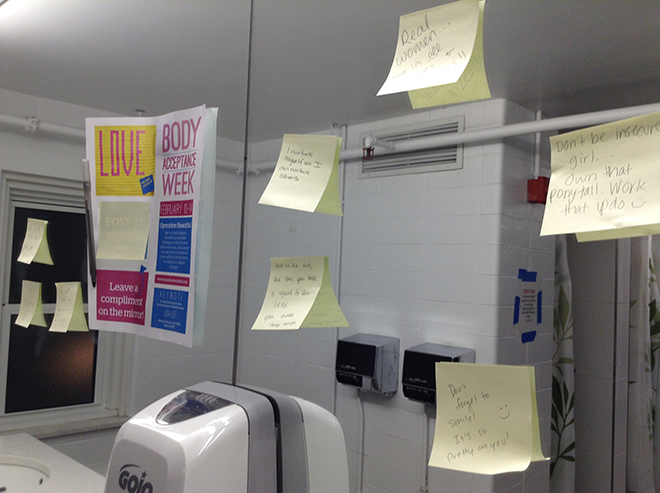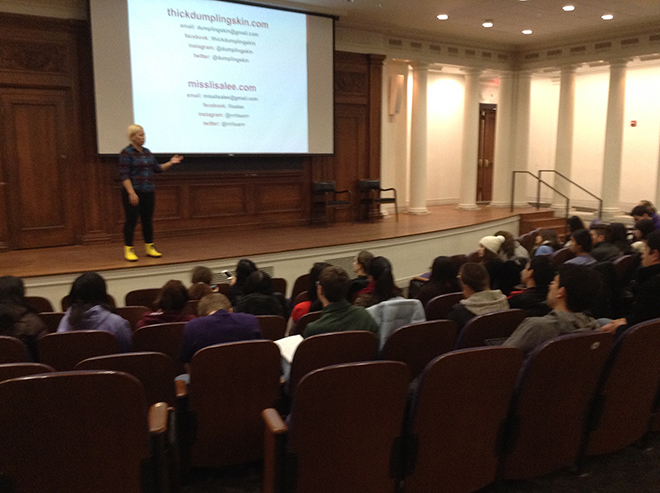
Yellow Post-its emerged on bathroom mirrors across campus on Sunday. The Post-its carry inspirational notes scrawled in black ballpoint pen: “Don’t be insecure girls... Own that ponytail, work that up-do,” “Y’all are beautiful” and “Real women come in all shapes and sizes,” they say. The Post-it notes were the first part of Body Acceptance Week, a campus-wide movement to promote positive body images at Northwestern.
Body Acceptance Week, organized by various campus groups including CAPS and ASG, aims to address the problems of unhealthy eating, living and self-perception habits that remain prevalent in college. The week will include lectures on the journey to body acceptance and mindful snacking, body affirmation stations on both North and South campus and a yoga class.
“We very consistently see students coming in who are worried about their body shape, who are worried about weight, who have poor eating habits, whether its stress eating or sometimes actually eating disorders like bulimia or anorexia,” said Elizabeth Gobbi, a staff psychiatrist at CAPS who was involved in organizing Body Acceptance Week. “A lot of undergraduates are aware that their friends or their roommate or someone in their hall has odd or problematic eating behaviors. If that awareness is raised on campus, it helps get students help.”
Body Acceptance Week officially began on Monday night with a keynote speech from Lisa Lee, Facebook’s former diversity program manager and co-creator of the website Thick Dumpling Skin. Lee’s speech, titled “The Quest for the Perfect Selfie: One Asian-American Woman’s Journey,” focused on how she was able to overcome her unhealthy body image, and the unique struggles she faced as an Asian-American.
“Growing up, I didn’t look like any of my cousins and didn’t really look like a lot of the Asian girls that I knew,” said Lee, who said she noticed from a very young age that she didn’t fit the “skinny” Asian girl stereotype. The summer after high school, Lee and her mother went to a weight loss spa where Lee lost 30 pounds over three months by drinking certain powders and getting cleansing massages.
During her freshman year of college, Lee said she believed she could reinvent herself with her new skinny body. “Now I could pretend to be somebody that I was not,” Lee said, to a full crowd in an amphitheater in Harris Hall. “I never really thought there was anything wrong with the way that I was treating my body.”

In college, young adults face new body pressures that have evolved since high school or middle school. Young adults coming in to college are looking for a partner or a romantic interest, explained Gobbi. “A lot of people equate looking the right way with being ready to date or even going on a job interview,” Gobbi said. “I think there’s a lot of social pressure to be thin and look put together and not all of it is healthy.”
When Lee got to college, she began to gain back the weight she lost, as her previous diet was unsustainable and unhealthy. She struggled to think in a positive and healthy way about food; One day she would avoid eating meals in the dining hall with friends and the next day she would binge-eat brownies from the dessert bar. Over time, Lee began to understand why she was thinking about her body in those negative ways and how she needed to change – inside, but not out.
“You have to be compassionate toward yourself,” Lee said. With the limited time you have in your life, Lee said, you can spend it obsessing about how you look or you can spend it improving yourself on a deeper level and improving your community.
Lee also spoke about how her website, Thick Dumpling Skin, can address the specific body awareness problems Asian-Americans face. With all people of color, Lee said, body issues are translated and taken to a new level when complicated by race and the fact that mass media lacks substantial representation of minorities.
“Eating disorders are not just a cause and effect of mass media, but it’s also very much cultural and very much familial,” Lee said. “Lots of Asian-Americans, especially Asian-American women, are very at the whim of stereotypes of how they are supposed to be small and they’re supposed to be petite.”
In order to improve body awareness and cultivate a positive body image, Lee said students should make a conscious decision to change the way they think and talk about weight, with the focus on health and happiness, not on superficial appearances.
Abi Koh, a Communications senior, said she enjoyed Lee’s speech because she was able to relate to the topics discussed.
“I feel like the Asian-American female voice is often not heard,” Koh said. “Usually when there’s talk about body issues, I feel like it comes from a more western perspective.”
Kody Keckler, a Medill freshman, said he thinks body image becomes more of a problem in college than in high school because of the increased pressure to approve of yourself, and that Lee’s speech informed him of new ways to look at body issues.
“It put body image into a new perspective for me,” said Kecker. “It really made me think about how race can also come into play.”
Eileen Biagi, a staff psychologist for CAPS and the main organizer of the event, said the speech was a success because of Lee’s heartfelt and genuine message.
“In the journey to loving yourself, there’s no final destination,” Lee said. “It takes your whole life.”